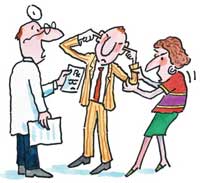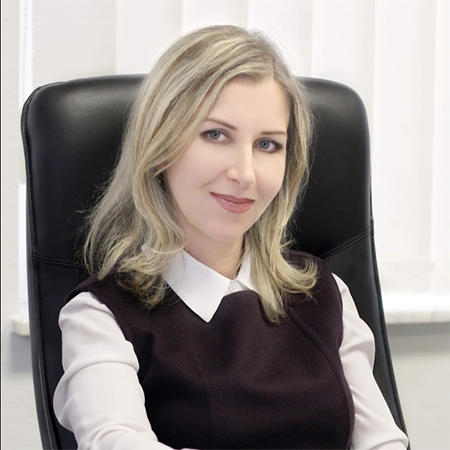Ischemic stroke
Ischemic stroke (IS) is a cerebral infarction that occurs as a result of blood flow cessation to the brain. IS develops when the lumen of the cerebral blood vessel closes, which leads to a cessation of blood supply to the brain. Also, supply of both oxygen and nutrients, which are necessary for the normal functioning of the brain, are ceased as well.
Causes
IS can be caused by the following conditions:
- Atherosclerosis of the arteries of the head and neck
- Arterial hypertension with damage to the small cerebral arteries
- Diabetes
- Heart rhythm abnormalities with the formation of blood clots in the heart cavities
Factors, causes, prevention and other information in Section Stroke
Consequences
The brain is an extremely complex organ that controls various functions of the body. If the blood can not reach the brain regions that are responsible for functions of certain parts of the body, these parts of the body will stop functioning properly.
After an ischemic stroke, people can experience:
- Motor disorders, weakness or paralysis - this can lead to difficulties in movements, walking and coordination. Movement disorder on only one side of the body is called hemiparesis or hemiplegia.
- Swallowing disorder. Swallowing disorder can cause food and liquid not getting into the esophagus directly, but getting into the respiratory tract and lungs. This can cause severe inflammation of the lungs. Swallowing disorder can also lead to constipation and dehydration.
- Speech disorder. Problems with reproduction and understanding of speech include difficulties in reading, writing and counting. They can occur as a result of damage to the left hemisphere of the brain.
- Perception problems Even with the normal vision, the person is not able to understand what he/she sees. Perception disorder makes it difficult for a person to use everyday objects. For example, person can`t take a glass, pour water into it and then drink it.
- Cognitive disorder In this case the ability to mentally percept and process external information is violated. Clear and logical thinking is distorted, memory of the person starts to deteriorate, the ability to learn, plan and make decisions is lost.
- Behavior disorder The person can experience aggression, slow response, fearfulness, emotional instability and disorganization.
- Bladder and bowel problems ТStroke can cause a variety of different problems, resulting in either bowel or bladder dysfunction (urinary incontinence or retention, fecal incontinence).
- Psychological disorders These include mood swings, depression, irritability, episodes of laughing or crying without an evident reason. Depression is a very common problem for people who have suffered stroke. It is often accompanied by loss of appetite, episodes of laughing or crying without a reason, insomnia, low self-esteem and an increased sense of anxiety.
- Epilepsy The number of stroke patients who eventually develop epilepsy ranges from 7% to 20%.
- Pain syndrome A small number of stroke patients can develop pain episodes manifested in burning, shooting and throbbing pain, which cannot be relieved with painkillers.
Risk of Recurrent Stroke
20% of people who have suffered ischemic stroke die within the first month and about 25% of them die within the first year.
Within the next 5 years, more than half of the surviving patients suffer the second stroke, with most cases occurring in the first year after an episode.
In Russia, about 100,000 cases of recurrent strokes are registered on average each year. Six months after the stroke, disability develops in 40% of surviving patients.
Within the first 5 years, up to 85% of patients either die or remain disabled and only the remaining 15% of patients manage to recover.
How to live after Ischemic Stroke?
In Germany and other countries of the European Union, ischemic stroke is not a diagnosis that condemns people to deep disability and death.
With a detailed and in-depth diagnosis of causes of ischemic stroke, early recovery from the effects of ischemic stroke and rehabilitation, millions of people who have suffered the condition can return to their normal life.
To receive professional consult regarding the treatment of ischemic stroke in Germany
Please call us: +49 228 972 723 72
or write Email here
Atrial fibrillation (AF) is one of the most common tachyarrhythmias in medical practice. Atrial fibrillation is an abnormal heart rhythm accompanied by frequent arousal and atrial contraction or fibrillation of certain groups of the muscle fibers. The manifestations of this condition mainly depend on its form, but general symptoms include chaotic or rapid heartbeats, sweating, weakness, shortness of breath.The most frequent complications of atrial fibrillation are thromboembolism, heart failure and stroke. Every sixth stroke occurs in patients with atrial fibrillation. Research shows that the risk of stroke with AF increases with age: at the age of 60 the stroke rate is 2,8%, at the age of 70 it reaches 10% and at the age over 80 it accounts for 23%. The treatment of this disease depends on its form (constant or paroxysmal) and in most cases involves medication.
 It is very common for the patients to be somehow stubborn, negligent and reluctant when undergoing post-stroke rehabilitation which in many ways complicates the already difficult recovery process. Below are some of the most common manifestations. The patient’s family should carefully consider these typical situations and prevent their occurrence.
It is very common for the patients to be somehow stubborn, negligent and reluctant when undergoing post-stroke rehabilitation which in many ways complicates the already difficult recovery process. Below are some of the most common manifestations. The patient’s family should carefully consider these typical situations and prevent their occurrence.
In some cases, the symptoms of stroke may be unpronounced. If the condition does not have obvious manifestations, it does not mean that it is less dangerous. In this case the patient should undergo tests to determine three signs (described above)! Example: person’s mood changes suddenly without any reason/after a fall, which can also be an effect of stroke.
The likelihood of developing cognitive neurological disorders, including people who have not suffered any stroke, increases due to high blood pressure and other risk factors for stroke.
For example, have you ever suddenly found yourself in a garage with an unknown purpose? Do you often experience difficulties with names? Do you often worry for the iron you left plugged in?
The researchers discovered that those women who eat foods rich in antioxidants are less likely to develop cardiovascular diseases.
Dyslexia or inability to read can be one of the possible effects of stroke. Such complication can occur even with the preservation of speech function or ability to write.
Those who eat food rich in magnesium every day, such as green vegetables, nuts, beans, are less likely to develop stroke.
The patients with post-stroke unilateral spatial agnosia who had undergone a two-week course of transcranial magnetic stimulation showed significant improvements during the clinical trials.
According to scientists, both oranges and grapefruits can protect body from the risk of stroke due to their antioxidant properties.



